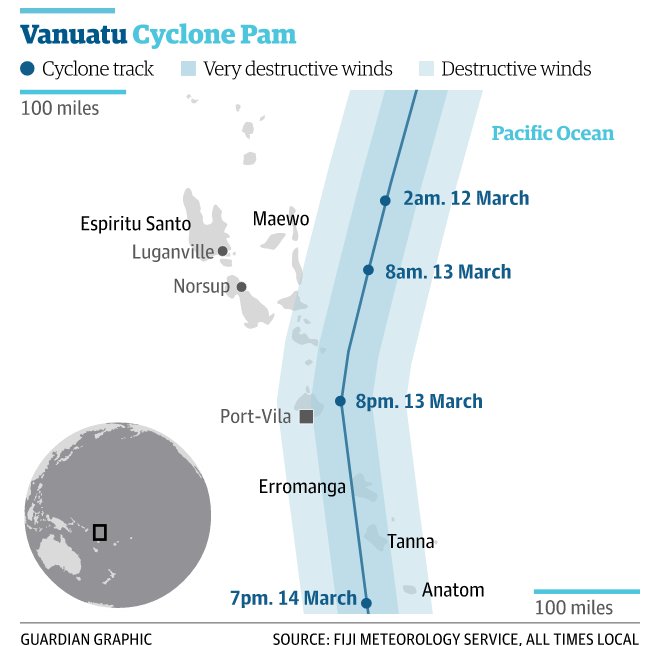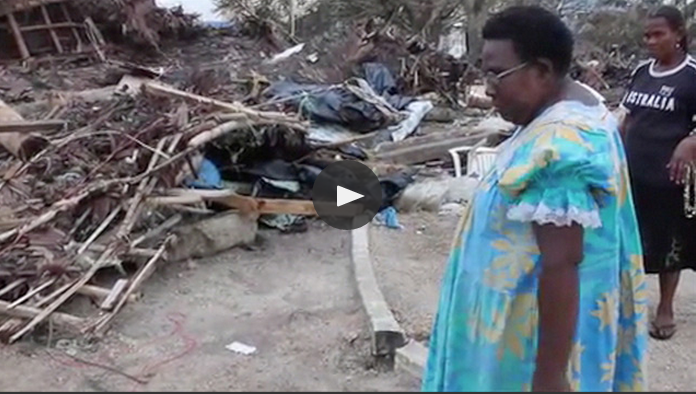This story was originally published by The Guardian and is reproduced here as part of the Climate Desk collaboration.
The president of Vanuatu says climate change is contributing to more extreme weather conditions and cyclone seasons, after cyclone Pam ripped through the island nation.
The damage from the Category 5 storm to the island nation has been extensive, and is still being assessed as aid workers scrambled to get to affected areas on Monday morning.
The official death toll remains at six, with many more injured, and is expected to rise as communication begins to be restored.
Vanuatu’s president, Baldwin Lonsdale, spoke at a United Nations world conference in Sendai, Japan, on March 16, and said the storm was a major setback for the people, virtually wiping out Vanuatu’s development.

“This is a very devastating cyclone … I term it a monster that has hit Vanuatu,” he said. “It is a setback for the government and for the people of Vanuatu … All the development that has taken place has been wiped out.”
He said the cyclone seasons that the nation had experienced were directly linked to climate change.
“We see the level of sea rise … The cyclone seasons, the warm, the rain, all this is affected,” he said.
“This year we have more than in any year … Yes, climate change is contributing to this.
“I am very emotional … Everyone has that same feeling. We don’t know what happened to our families … We cannot reach our families; we do not know if our families are safe.
“As the leader of the nation, my heart hurts for the people of the whole nation.”
The president of Kiribati, Anote Tong, who was also at the conference, extended his condolences to Lonsdale and also urged action on climate change.
“It is time to act … Let us match the rhetoric of these international gatherings with pledges and commitments as leaders to do our best to improve conditions and lives of those who need it most,” he said.
“For leaders of low-lying island atolls, the hazards of global warming affect our people in different ways, and it is a catastrophe that impinges on our rights … and our survival into the future.”
The cyclone caused major infrastructure damage to the island nation with up to 90 percent of structures believed to have been leveled in Efate. Winds were estimated to have reached 250 kilometers (155 miles) per hour, according to the United Nations Office for the Coordination of Humanitarian Affairs.
The damage is also extensive in the capital, Port Vila, which one Unicef officer said looked like it had been “hit by a bomb.”
Unicef has expressed serious concerns over children who have been displaced or affected by the cyclone. The organization estimates that at least 60,000 children may be at risk, and have called for funding to provide child health needs, food, and water.
Communications in the Port Vila province of the island have now been “almost fully restored,” according to telecommunications provider Digicel, allowing information to flow more freely to and from disaster areas.
Several countries have also pledged additional aid and funding for the stricken island nation. The Australian foreign affairs minister, Julie Bishop, pledged $5 million in support, and New Zealand has offered $2.5 million.
Bishop said on Monday, March 16 that Australia was working closely to provide support, and had sent several military planes with supplies and aid workers.
“We are aware that this has been a most devastating cyclone,” she said. “The impact will be felt for quite some time … We stand ready to assist in the long-term recovery efforts.”
Cyclone Pam has traveled south after passing over Vanuatu, and reached New Zealand on Monday. The cyclone was downgraded from a Category 5 storm but conditions have been poor in some areas of the country.
In Gisborne, in northeast New Zealand, about 40 people were evacuated from sea-level homes, and schools were closed.



